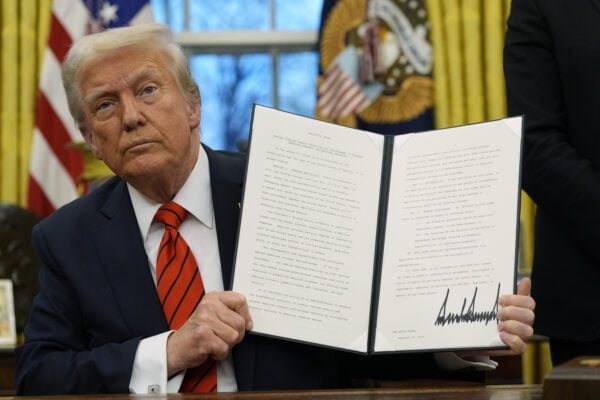President Donald Trump’s second term in office has been marked by sweeping executive actions, confrontational policy shifts and a restored focus on his signature campaign issues during the critical first 100 days.
The administration moved quickly to implement hardline immigration policies, pursue economic deregulation and advance an “America First” foreign policy agenda, drawing strong support and fierce backlash.
Immigration enforcement emerged as a defining priority of Trump’s second term. The administration reinstated and expanded several policies from his first term, enforcing stricter asylum rules that fast-track deportations and limit eligibility.
Another immediate move made by the administration was the implementation of tariffs or taxes on imports. Aside from the volley of executive orders and focus on national security, the administration’s implementation of tariffs is the most notable move within the first 100 days.
Trade policy remains a focal point, with the U.S. reengaging negotiations with China to address what Trump characterizes as unfair trade practices.

Construction efforts on the U.S.-Mexico border wall resumed despite ongoing legal challenges and funding disputes.
Immigration and Customs Enforcement significantly increased operations, targeting not only undocumented immigrants with criminal records but also long-term residents with deep community ties. Economically, the Trump administration prioritized tax cuts and deregulation as key growth drivers. New tax legislation that would primarily benefit corporations and high earners has been proposed, with the administration arguing these cuts will boost business investment and job creation.
Federal agencies received directives to roll back environmental, financial and labor regulations. Moreover, the Trump administration has slashed many policies associated with Diversity, Equity and Inclusion (DEI).
However, no major new agreements have been finalized yet.
While financial markets remain (mostly) stable, economists continue to debate whether these policies will ultimately benefit middle-class workers or worsen existing income inequality.
These initiatives face significant obstacles during the administration’s first 100 days. Multiple executive actions have been challenged in court, slowing their implementation, while congressional opposition stalls key legislative prerogatives.
As the second term progresses beyond this initial phase, the long-term impact of these early policies will become more apparent. Political analysts suggest that the administration’s ability to overcome legal and legislative hurdles determines whether it can maintain its current momentum.
According to Morning Consultant, Trump’s first 100 days have been ranked less than stellar, with 53% of respondents claiming the administration’s moves have been “unfavorable.”
Contact Multi-Media & Senior Sports Reporter Noral Parham at 317-762-7846. Follow him on X @3Noral. For more news, click here.
Noral Parham is the multi-media reporter for the Indianapolis Recorder, one of the oldest Black publications in the country. Prior to joining the Recorder, Parham served as the community advocate of the MLK Center in Indianapolis and senior copywriter for an e-commerce and marketing firm in Denver.






